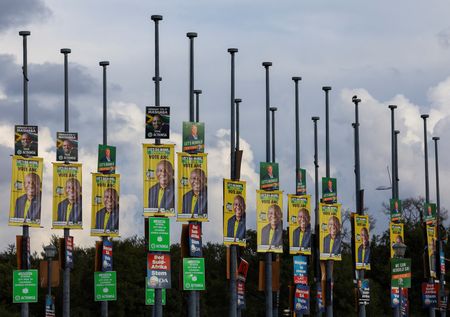JOHANNESBURG (Reuters) – South Africa’s election on May 29 could bring momentous change, with polls suggesting the ruling African National Congress is likely to lose its majority after 30 years in power.
The following are key facts about the ANC and rival parties, including smaller ones that could play a pivotal role in forming a coalition government, should the opportunity arise.
AFRICAN NATIONAL CONGRESS
The ANC enjoys rock-solid loyalty from many Black South Africans, especially older voters, due to its heroic past as a liberation movement that helped end apartheid and usher in multi-racial democracy under the leadership of Nelson Mandela.
It has won a majority in national elections held every five years since 1994, but its support has dwindled in recent years due to persistent poverty and inequality, high unemployment, corruption scandals, erratic power supply and high crime rates.
If the polls are correct, the ANC is on course to lose its majority for the first time since it came to power, but it should still be the largest party by a wide margin, raising the possibility of coalition talks.
President Cyril Ramaphosa could face an internal leadership challenge if the party is perceived to have performed poorly.
The ANC has outperformed poll numbers in previous elections and some analysts say it could win again, pointing to its formidable campaigning machine and the advantages of incumbency.
DEMOCRATIC ALLIANCE
The pro-business DA, which won the second-largest share of the vote in the last election, has formed an alliance with several smaller parties in an effort to broaden its appeal.
The party controls the provincial government of Western Cape, where South Africa’s second most populous city, Cape Town, is located.
The party proposes to scrap the ANC’s flagship Black empowerment scheme, which its leader John Steenhuisen has described as “racial bean counting”, in favour of policies focused on reducing poverty regardless of skin colour.
Steenhuisen, who has not ruled out a post-election deal with the ANC, has rejected criticism that the DA represents white privilege, saying it wants to practise good governance for the benefit of all South Africans.
The DA released a campaign advert in which a South African flag is seen slowly burning, presented as a symbol of the risks facing the nation should the ANC go into coalition with left-wing parties. Ramaphosa condemned what he described as an abuse of the national flag for party political purposes.
ECONOMIC FREEDOM FIGHTERS
Formed in 2013 by Julius Malema, a firebrand former leader of the ANC’s youth wing who broke away from the party, the EFF draws its support predominantly from voters who are young, poor and Black.
The party presents itself as Marxist, advocating the nationalisation of industries and land redistribution to address racial injustice — policies that are unpopular with South Africa’s business community.
The EFF is seen as a potential coalition partner for the ANC due to Malema’s historic ties with the ruling party.
UMKHONTO WE SIZWE (MK)
The MK party is a recent entrant, having been registered in September 2023, but it received a major boost when former president Jacob Zuma, who has fallen out with the ANC, announced in December he was backing it.
Polls suggest it has been eating into the EFF’s support base and could attract significant votes on May 29, especially in Zuma’s home province of KwaZulu Natal where he retains a loyal following.
The EFF’s Malema, who has a complicated history with Zuma, has said his party is open to a post-election alliance with MK. Malema was once Zuma’s protege, but the pair fell out, after which Malema left the ANC.
MK is named after the ANC’s former armed wing in the apartheid era.
INKATHA FREEDOM PARTY
The socially conservative IFP, led by Velenkosini Hlabisa, draws its support from KwaZulu Natal province, the Zulu heartland. Its policies include giving more power to traditional rulers and launching a national debate on reinstating the death penalty.
Founded in 1975 by Zulu nationalist leader Mangosuthu Buthelezi, the IFP has a fraught history with the ANC. The parties were in violent conflict during the final years of apartheid, but worked together in the government of national unity that was formed after the 1994 election.
ACTIONSA
Founded in 2020, ActionSA is popular in the country’s richest province of Gauteng, where the commercial capital Johannesburg is located. Its leader Herman Mashaba was the city’s mayor, though he was part of the DA at the time.
The party says it favours minimal government interference in the economy.
(Reporting by Bhargav Acharya and Tannur Anders; Editing by Estelle Shirbon and Ed Osmond)
Brought to you by www.srnnews.com







